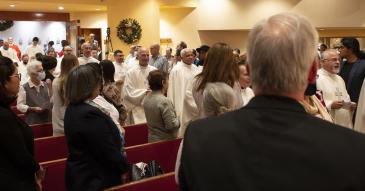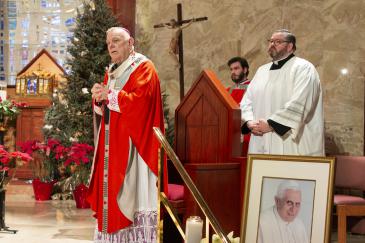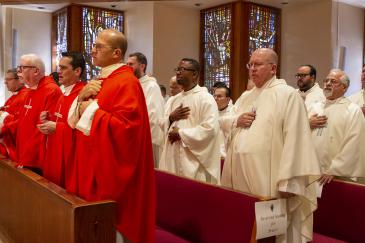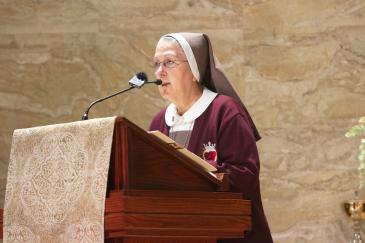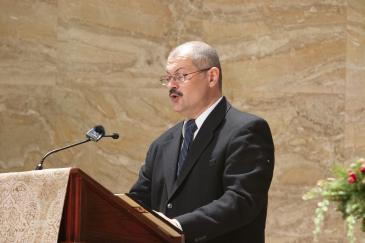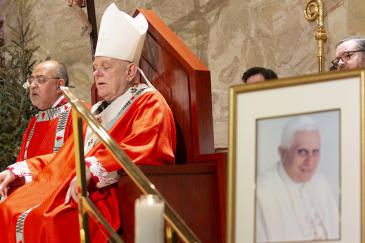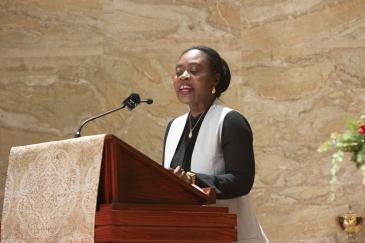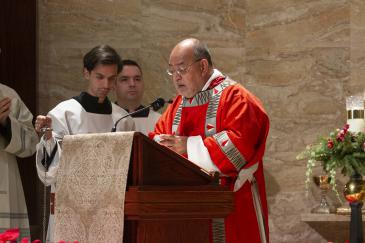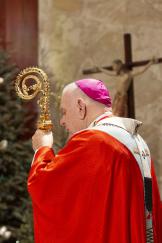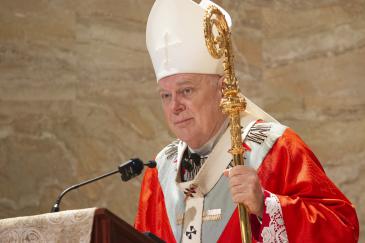By Archbishop Thomas Wenski - The Archdiocese of Miami
Photography: ANA RODRIGUEZ-SOTO | FC
Archbishop Thomas Wenski preached this homily while celebrating a memorial Mass for Pope Benedict XVI on the same day of his funeral in Rome, Jan. 5, 2023 at St. Martha Church in Miami Shores.
Today in churches throughout the world, Catholics and others of good faith join in prayer for the repose of the soul of Joseph Ratzinger, who served for almost eight years in the See of Peter as Pope Benedict XVI. Now 10 years after his retirement, he has gone home to the Father.
When he made his announcement to step down at the age of 86, many in the world were shocked and not a few were dismayed. I remember that on the day of his retirement, Robin Roberts of Good Morning America interviewed me by phone. When asked about my reaction, I told her of my having visited one of my pastors to tell him that it was time for him to retire and he asked me — after he greeted me at the door of his rectory steadied by his walker — “Did I do something wrong?” I answered, “No, father, but 83 is 83.” Well, at 86 and feeling the effects of his advancing age, Pope Benedict did nothing wrong in retiring. He acted, as he said, convinced that he was making his decision for the good of the Church.
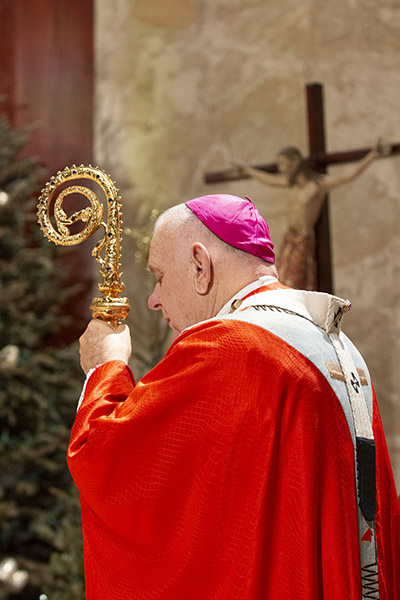
Photographer: ANA RODRIGUEZ-SOTO | FC
Archbishop Thomas Wenski listens to the Gospel while celebrating a memorial Mass for Pope emeritus Benedict XVI on the same day of his funeral in Rome, Jan. 5, 2023. The Mass was celebrated at St. Martha Church in Miami Shores, next door to the Pastoral Center. Pope Benedict XVI died Dec. 31, 2022.
In his spiritual testament, written in August of 2006, he noted that many of the various ideologies that alleged that the Church was dated, out of step, or wrong in her teachings had collapsed with the changing generations. These ideologies, inspired by liberalism, existentialism or Marxism, were only merely “a tangle of hypothesis” out of which “the reasonableness of faith has emerged” (and is still emerging). “Jesus Christ,” he affirmed, “is truly the Way, the Truth and the Life and the Church, in all her shortcomings, is truly His Body.”
Joseph Ratzinger was a priest, a bishop, a cardinal, and a pope. He was also a brilliant intellectual and scholar who served as a “peritus” during the Second Vatican Council. He lived through the tragedy of the Second World War, the Cultural Revolutions of the 1960s and the “aggiornamento” of the post Vatican II era. In his writings, in his preaching, in his life dedicated to Christ, he witnessed to the reasonableness of faith standing strong against what he called “the dictatorship of relativism” or what his successor Pope Francis would term as “ideological colonization.” His overriding priority was to make God present in this world and to show men and women the way to God.
In 2007, he presided over the meeting of the bishops of CELAM in Aparecida, Brazil. The document which emerged from the meeting — which Jorge Bergoglio had a hand in writing — anticipated Pope Francis’ inaugural Apostolic Exhortation, Evangelii Gaudium, the Joy of the Gospel. In that Aparecida document, the phrase “missionary disciples” figured predominately. But Benedict insisted that the phrase was incomplete for it begged the question “why”? And he provided the “why”: “disciples and missionaries of Christ so that our people will have life in Him (discípulos y misioneros de Jesucristo para que nuestros pueblos en él tengan vida).”
In other words, as Pope Benedict has said — and Pope Francis has repeated —Christianity is not an ideology, it is not merely a moral system; it is above all a relationship with a person, Jesus Christ.
Thus, missionary disciples have encountered Jesus through a personal experience of the love and presence of God. As a result of this encounter, they have chosen to say ‘yes’ — to surrender to God's love and God’s will for their life. They allow their entire life to be transformed by this relationship. Pope Ratzinger was truly such a missionary disciple. Pope Benedict has taught us that "To be a Christian is not a burden but a gift; to have encountered the Lord is the best thing that has ever happened to us, and to share him with others is our joy."
Some allege that the Second Vatican Council represented a rupture, a break, from what had gone before it. Joseph Ratzinger, as a theologian and peritus of the Council, insisted that the Council was not a rupture and sought to point out its continuity with what the Church has always believed and taught. As St. John Paul II, whom Joseph Ratzinger served as his closest collaborator, was fond of repeating this verse from Hebrews: Jesus Christ is the same yesterday and today, and forever. (Hebrews 8:13)
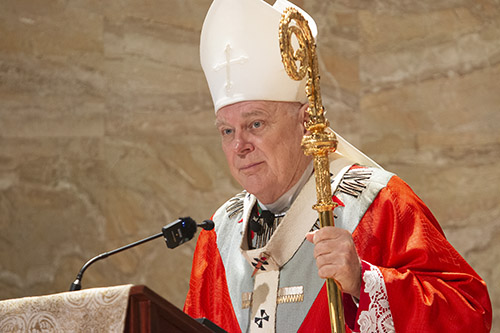
Photographer: ANA RODRIGUEZ-SOTO | FC
Archbishop Thomas Wenski preaches the homily while celebrating a memorial Mass for Pope emeritus Benedict XVI on the same day of his funeral in Rome, Jan. 5, 2023. The Mass was celebrated at St. Martha Church in Miami Shores, next door to the Pastoral Center. Pope Benedict XVI died Dec. 31, 2022.
Each pope brings to their ministry their unique gifts — and shortcomings. This is also true of every bishop and parish priest. We all have our perspectives, our priorities and what we can do or cannot do is constrained not only by our human limitations but also by events beyond our control.
We would be rash to judge differences of style, temperament, or emphases as signs of rupture and not see the threads of continuity in the pontificates of the recent successors of St. Peter. For example, in the light of Laudato Si and the Synod on Amazonia, we know well of Pope Francis’ concern for the environment. Many would not remember the climate crisis as being a top priority of Pope Benedict. But it was Benedict who oversaw the installation of solar panels on the Vatican's Nervi Hall, and he approved of the Vatican funding a Hungarian forest, a move aimed at making Vatican City the first country to become carbon neutral. This latter move helped Pope Benedict XVI earn the label of “The Green Pope” by the world press. There is no rupture but continuity between “green” and “greener.”
Some unfairly disparaged Ratzinger as “God’s Rottweiler”; but as pope he received and dined with Hans Kung, his longtime theological adversary. He was a gentle shepherd — even if he was a German shepherd.
Pope Benedict wrote in Deus Caritas Est: “In all humility we will do what we can, and in all humility we will entrust the rest to the Lord. It is God who governs the world, not we. We offer him our service only to the extent that we can, and for as long as he grants us the strength. To do all we can with what strength we have, however, is the task which keeps the good servant of Jesus Christ always at work: ‘The love of Christ urges us on’ (2 Cor 5: 14).” #35 Deus Caritas Est.
We entrust him to the Lord grateful for his long and fruitful ministry in the Church and for the Church. May the Jesus, the Good Shepherd, welcome him saying: “Well done, my good and faithful servant... Come, share your master’s joy.”
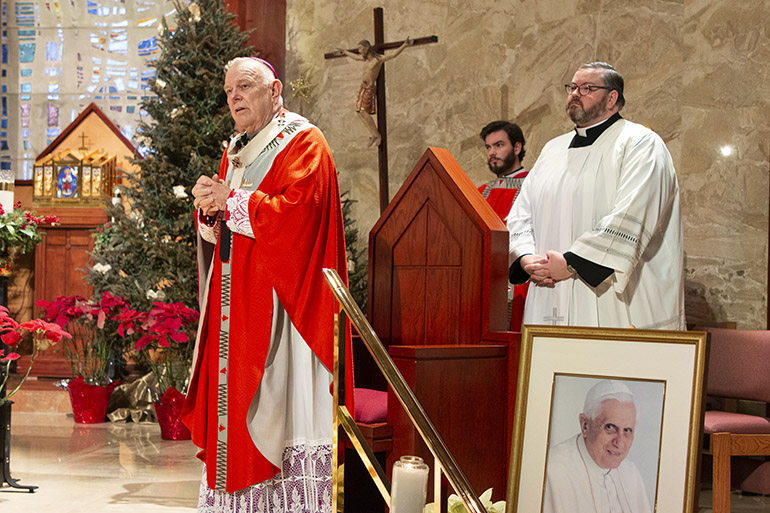
Photographer: ANA RODRIGUEZ-SOTO | FC
Archbishop Thomas Wenski celebrates a memorial Mass for Pope emeritus Benedict XVI on the same day of his funeral in Rome, Jan. 5, 2023. The Mass was celebrated at St. Martha Church in Miami Shores, next door to the Pastoral Center. Pope Benedict XVI died Dec. 31, 2022.


